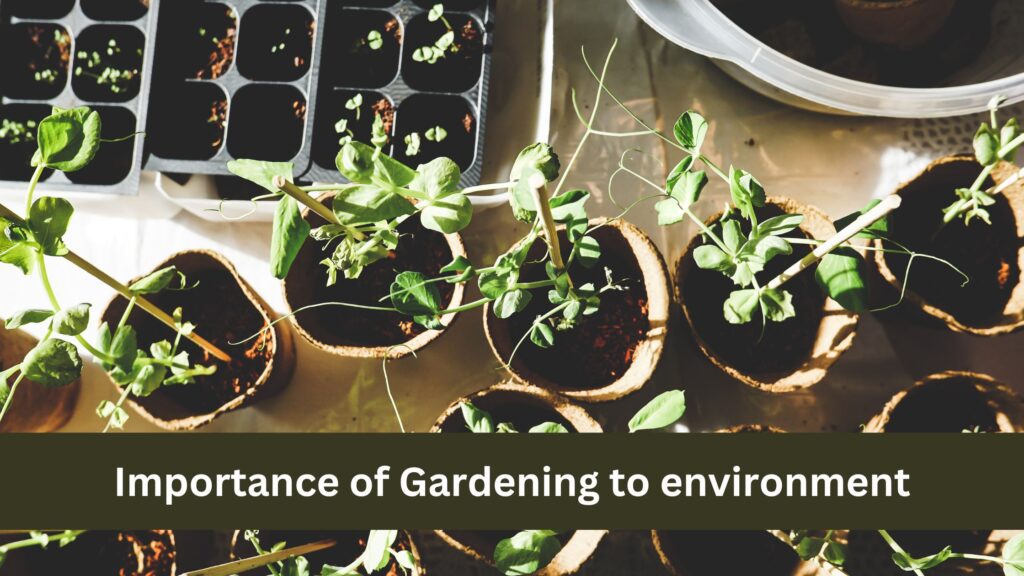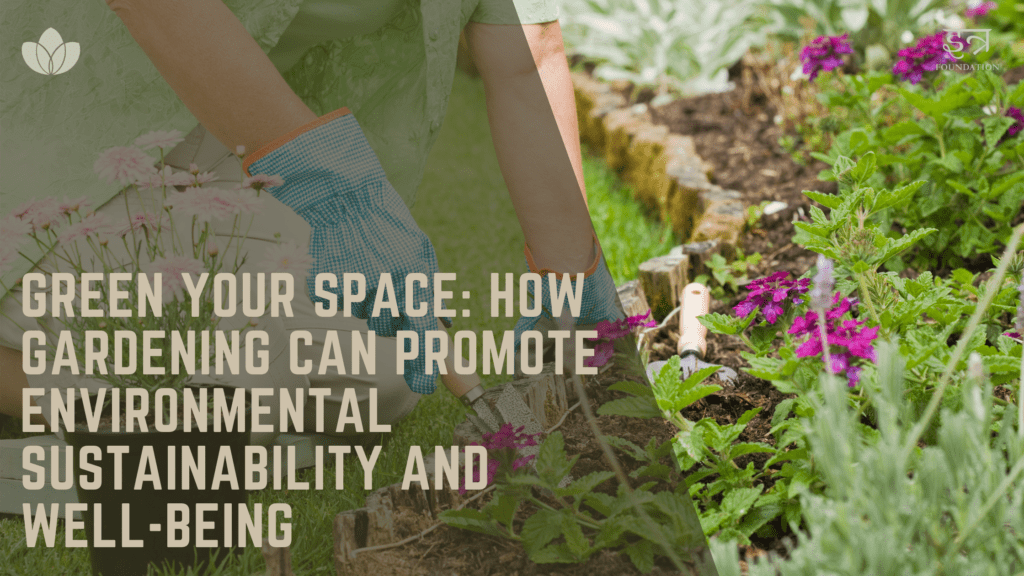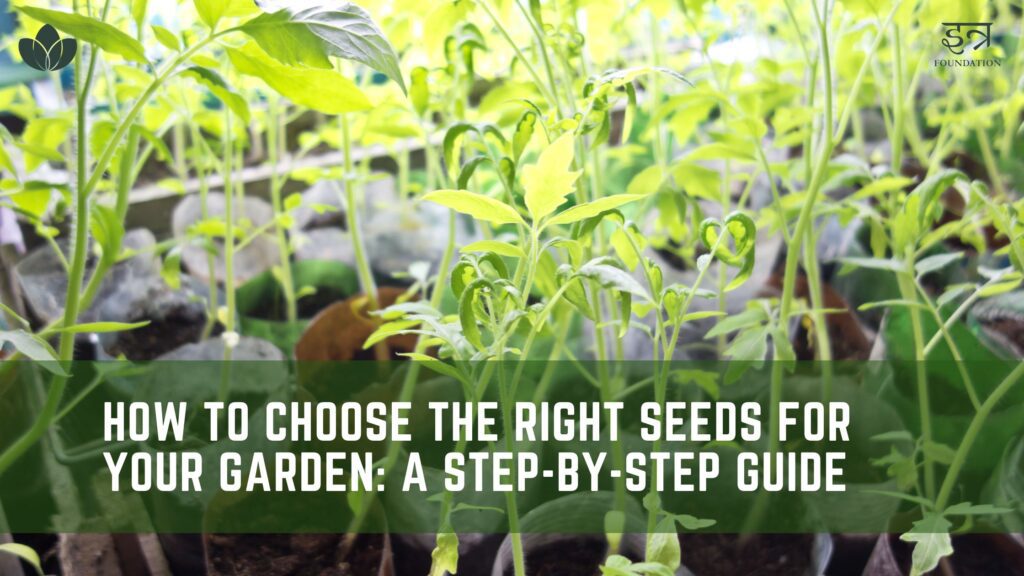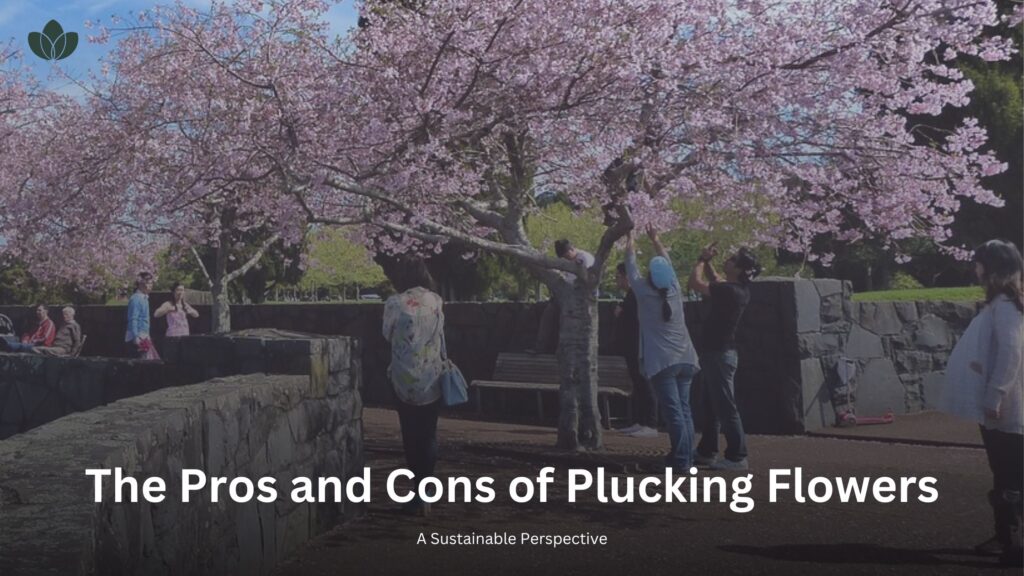A garden is that one place in our household/ community/city where we go to rejuvenate ourselves and enjoy a sense of calmness while connecting with nature. But do you know gardens are extremely beneficial to the environment as well?
Whether it’s reducing pollution, minimizing soil erosion, or providing a natural habitat for birds, gardens are extremely important for the environment around us. Gardens, despite being human-made, represent a natural environment. Plants and trees grow there, taking in carbon and releasing oxygen. The roots of these plants stabilize the soil and filter water. Municipal gardens and national parks become safe havens for all manner of wild creatures that might have been otherwise displaced by the endless urban sprawl of the modern world.
Here’s how gardens helps the environment :
- Helps reduce noise and air pollution : When you plant various types of trees and plants in your garden, the amount of oxygen they produce is also increased significantly which in turn purifies the air that gets polluted with the cars and machines in cities. If you are wondering why gardens are so peaceful and quiet, its because of the trunks, branches and leaves of the trees/plants that help absorb excess noise from the surroundings.
- Protects local wildlife : Gardens are a natural habitat for many animals like birds, squirrels, insects like bees butterfly which are great pollinators and benefit from the environment.
- Increases oxygen important for all living beings : Ever wondered why we feel so fresh and rejuvenated in our gardens or mountains or rainforests? Its because of the purity of oxygen in those areas as plants breathe out oxygen.
- Reduces carbon footprints : Locally grown food can eliminate the need of transportation of food from the farms or stores to your homes and hence reduces carbon footprints.
- Reduces the size of landfills : Landfills are places where your entire household trash is dumbed that’s decomposing or burnt emitting methane gas which is again harmful to atmosphere. Using kitchen waste for composting in your garden, which in turn provides nutrients to your gardens, and recycling relevant waste will reduce the size of landfills.
How Gardening promotes soil health and it’s fertility ?
As we all know, to grow healthy plants that are sustainable, it’s important to have a fertile soil. “Soil fertility refers to the ability of the soil to sustain plant growth.” Fertile soil results in high yield and better quality of plants. Fertile soil is rich in fundamental elements and minerals, has good aeration, water holding capacity, and good texture.
Fertility of the soil can be achieved by adding fertilizers to the soil, adding organic matter, mulching, tillage, and regular soil testing for its nutrients deficiency to take necessary steps to improve that. One of the ways to add organic matter to soil is to plant cover crops i.e. gardening with small plants that are not meant to harvest. Some of the covers crops examples are alfalfa, clover, beans, peas or vetch. The dried leave of cover crops falling on the soil serves as an organic matter for the soil, enriching its nutrients further. Cover crops also help prevent soil erosions and nutrients run off from soil. This is how gardening helps soil’s health and fertility.
We have been hearing a lot these days on organic farming and many of us have got inclined to buying organic foods directly from the farms.
What exactly is organic farming? Organic farming is cultivating with natural methods without use of any chemicals. We enrich our soil with fertilizers, protect plants from pests with pesticides etc. Fertilizers, pesticides could be with chemicals or chemicals free (natural) Growing crops without using chemicals is more eco-friendly because the crops are grown naturally. You are not using pesticides, fungicides, and herbicides, which are essentially poisons that pollute the soil and waterways. In addition, when you are not using chemicals to treat your crops, your soil remains nutrient rich. That’s because you are not destroying the biodiversity of the soil. All the plant-friendly bacteria and garden critters are working hard putting the nutrients back into the soil. The result? Better soil and plant health!This is Organic farming / growing plants with natural methods.
Role of gardening in promoting biodiversity in urban areas!
Biodiversity is the diversity of life in a habitat or ecosystem which is a sign of the health of that habitat or ecosystem. Cities usually are the harshest habitat for living beings, whether its plants or animals. However, if planned well gardens can improve the liveability and hence biodiversity. The field of urban ecology (i.e.the study of ecosystems that include humans living in cities and urbanizing landscapes), has shed light on how green infrastructure can offer solutions to the issues faced by urban development. Green infrastructure includes planting trees and bushes, naturalizing parks etc, which has resulted in providing excellent habitat for biodiversity. Planting functionally different and, ideally, native species that extend the period of flowering and fruiting throughout the growing season provides excellent habitat for pollinating insects, birds and many other animals.
Role of gardening in Carbon Sequestration!
What is Carbon Sequestration ?
Carbon dioxide is the most commonly produced greenhouse gas. Carbon sequestration is the process of capturing and storing atmospheric carbon dioxide. It is one method of reducing the amount of carbon dioxide in the atmosphere with the goal of reducing global climate change which is a very hot topic in UNCC. (COP27)
As gardening has many benefits to the environment and living beings. It also helps with Carbon Sequestration. Our garden soil is a carbon sink. Healthy soil offsets emissions by soaking up carbon from dead plant matter. To lock in as much carbon as possible, soil needs a good balance of water, pockets of air, living organisms, such as fungi, and nutrients. Gardeners maintain this balance by constantly adding organic material to their soil as its needed to feed all the living organisms, which will help keep soil healthy.
Role of gardening in promoting Mental health and Well being!
Research has shown that spending time outside is good for our bodies and our minds. I’m sure most of us have experienced these benefits: After feeling stressed out @work or staying bored indoors, you step outside and your spirits lift. One great way to spend time outdoors is to garden.
Gardening gives you an opportunity to stay physically active, even when you don’t feel like going to the gym, you can maintain muscle tone and feel good through regular work in the garden. When you are in the garden you feel a life all around you with fresh smell, beautiful colors, the warmth of the sun, the soil in your hands, all senses get activated and all stress released. Out in the garden is not only about plants but also observing and listening to sounds of birds and insects leaves you calm and at peace.
The Japanese expression “shinrin-yoku” can be translated as “forest bathing,” which nicely captures the experience of being immersed in green. Studies have found evidence that being in green, or even being able to look out on a green landscape, is linked with better recovery from surgery, less anxiety and depression, better stress management, and many other positive effects. Many feel like a parent to the growing plants, they nurture their plants like their children and work on providing all the nutrients to grow them in a healthy way.
Shall we start our own garden?
After going through all benefits of gardening above, I believe we all would like to start our own garden even though a small start but sustainable one and get a daily dose of benefits that it offers.
Wrapping up with above benefits of gardening, Itra foundation encourages everyone to join them to learn more on gardening as you start your own and contribute to cleaning the environment, improving your health and well being, creating a habitat for wildlife, nourishing the soil for better growth of plants.






